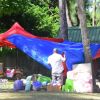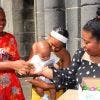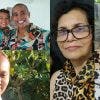
This is part of a series of articles we have dedicated to the International Day of Older Persons which falls on Tuesday 1 October. Our readers will recall that the day is celebrated by virtue of UN General Assembly Resolution 45/106 of the 14th December 1990. It is imperative that we give its full importance to this Day as here and elsewhere in the world we have an ageing population which raises a host of challenges.
Publicité
IDOP 2019
The 1st of October is therefore a day to celebrate older people. We are two Human Rights NGOs coalescing this year to pay homage to our elders, DIS-MOI and L’ATELER SA NOU VIZE. It is in the practice of DIS-MOI to put up events in a decentralized locus as testified by our large number of conferences on the rights of older people we have conducted across the country. For its part L’ATELIER SA NOU VIZE is a recognized grass-root organization combating poverty in the southern region of the country, around Rose-Belle and Grand Bois. It stands to reason that their target includes a large number of older people who, like many across the world, need to know their rights.
We are fortunate to obtain a wide range of support from stakeholders including the Grand Port District Council, the Rose-Belle Village Council, and the Brahma Kumaris Light House Center. We want to celebrate older people, to project spotlights on the value of all older persons through a public conference where we shall hear, inter alia, older persons talking of their experience with regards to welfare, independence and autonomy, abuse and ageism.
An interactive session to be handled by the expert techniques of the Brahma Kumaris Light House Center in Rose-Belle will allow to look into the mirror, the Treasures of the Past and ahead, Hope for the Future.
Thirdly we are inviting young and older people to march hand in hand to claim respect and promote dignity. This is in the philosophy enshrined in the theme of IDOP this year: The Journey to Age Equality.
AGEISM
Almost every week we read of violence, most of the time physical, perpetrated by close ones on their old parents. We condemn them but there are so many, yes so many, that we are getting used to a sort of banality. But what of different types of ageism which is a most tolerated form of social prejudice. Many elders are politely invited or rudely ordered to keep quiet as if their opinion does not count. They are unequal among equals, or like George Orwell put it ‘there are people who are more equal’.
Ageist attitudes can be experienced at home, in the workplace as between ambitious younger workers downgrading the experience of their older colleagues to take their posts. Fortunately it’s very rare to hear of ‘sa vye bonom……. sa vye bonnfam …….’ with reference to an older member of another community.
I’m appalled at how often we read and hear about people being treated differently because of their age. Public bus transport has become a headache for many. We can only reach equality in this sector if an equal treatment were meted to the older citizen when she has to climb six steps to get into the bus and access a seat before the driver brings the engine to life. What does it take to be courteous towards a human being irrespective of her or his age.
THE MEDIA
Thanks to the media we have a large display of the sufferings and misery of those of our fellow citizens who have very limited resources, if not falling in the category of destitute. Otherwise we read about those who have succeeded in life by their own efforts or by the solidarity of the ones dear and near to them. The accounts of the non-achievers and achievers illustrate the notion of equity and equality or inequity and inequality. The idea is not to blame those of us who have succeeded, far from that because they can be role models and not to equally blame others for their failure. It’s time to change our attitude towards people of different ages and our attitude to ageing in any socio-economic class.
Human rights activists derive a major support from the media by the message they convey and for publishing the activists’ opinion which can go far into changing the unceremonious attitude of one or another vis-à-vis the older persons. The journey to equality isn’t an easy task but it is achievable.
THE SCHOOL
While the media educates the masses in the informal mode, the school, which is not dead to human development, should formally teach the learners what respect, dignity and age equality mean.
I am not taking the paternity of the sacrosanct notion that we start ageing the very day we are born. Schools have placarded their mission statement and vision which, though labelled in different wordings, render the same message: produce an intelligent cohort of leaners who will be responsible, employable, respectful of their environment and capable of contributing to the socio-economic development of the country and more. Our children are told to respect their teachers as they respect their parents. And that’s that. It was time that the school programme includes a dose of human rights so that we produce a nation of rights owners yes but also a nation of rights defenders.
AN INCLUSIVE SOCIETY
In DIS-MOI we have often pleaded for an inclusive society with people who operate and interact with an open mind and an open heart. In this respect, we would place high the dignity of each individual, an older person for that matter. The wellbeing of an older person is enhanced if she or he has the opportunities to achieve in life even after complete retirement. The right to work for a decent pay should be respected, the right to independence and autonomy, the right to life-long education and training should be a matter of normalcy.
We cannot talk of an inclusive society without ensuring equity. We have to ensure that the authorities invest resources to help those who are disadvantaged or are in greatest need.
Vijay Naraidoo
President of the Commission for the Rights of Older People of DIS-MOI

Notre service WhatsApp. Vous êtes témoins d`un événement d`actualité ou d`une scène insolite? Envoyez-nous vos photos ou vidéos sur le 5 259 82 00 !





















